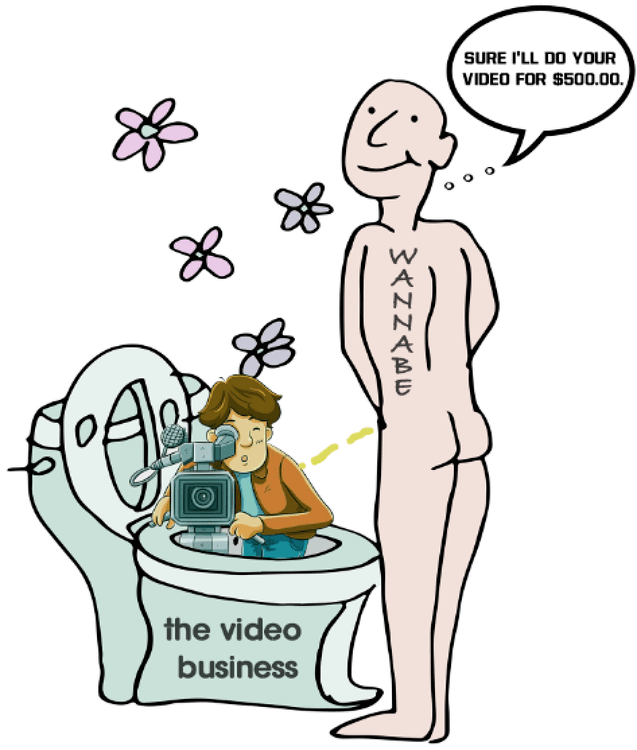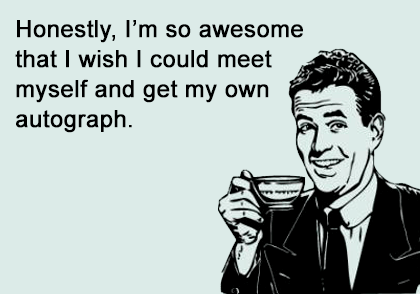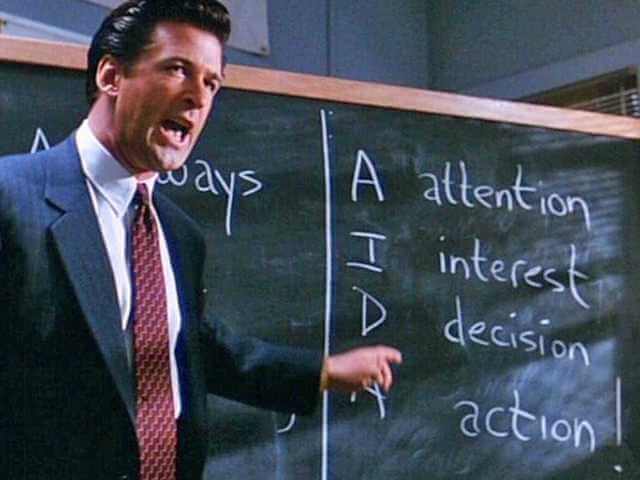 Let’s face it: the film and television industry is riddled with wannabes. Sometimes it seems like just about everyone, particularly in Atlanta, is the “CEO” or “President” of a media company. Putting it on a business card does not make it a reality. The problem I have with wannabes is twofold. The first issue is that people with severely lacking skills bid on projects at rates that would be unsustainable for any real business. The second is that these same people pass off wildly inaccurate information as fact, causing confusion for clients and the frequent need for extensive re-eductation about reasonable rates and expectations.
Let’s face it: the film and television industry is riddled with wannabes. Sometimes it seems like just about everyone, particularly in Atlanta, is the “CEO” or “President” of a media company. Putting it on a business card does not make it a reality. The problem I have with wannabes is twofold. The first issue is that people with severely lacking skills bid on projects at rates that would be unsustainable for any real business. The second is that these same people pass off wildly inaccurate information as fact, causing confusion for clients and the frequent need for extensive re-eductation about reasonable rates and expectations.
The entertainment industry is a challenging business ecosystem. Being a master of your craft is undeniably important, but it’s only the first step. If you are looking to make a living producing content like films, music videos, television shows, or even corporate video you must have a strong understanding of business principals and be willing and able to cultivate the right relationships to generate enough cashflow to sustain (and eventually grow) your operation.
Nothing happens in this industry without money. If you are looking for long lasting creative freedom there is only one way to get it, and that’s by having access to financial resources. To get that money you need to work hard. Period. Working hard is not getting on social media and talking about what you want to do. Working hard is not getting business cards printed. Working hard is not attending networking events. Working hard means practicing your craft every day. If you say you are a writer then you better be writing every single day. If you are a producer, then really produce something, or work under someone who is. If you fancy yourself a cinematographer you should be shooting, getting feedback from those with more experience than you and refining your skills. One of my favorite authors, Malcolm Gladwell, wrote a fascinating book called “Outliers”. Gladwell repeatedly mentions the “10,000-Hour Rule”, which states that the key to success in any field is, to a large extent, a matter of practicing a specific task for a total of at least 10,000 hours. There are of course other important factors involved in achieving success, like timing and opportunity, but beyond anything practice is key!
Let me paint a picture of the type of person I’m talking about when I say the word “wannabe”. I’m sure you know the type:
Wannabes don’t like to practice. What they like to do is talk. They want to act like they are in the game, but don’t want to do any of the years of hard work it takes to get there. They read a short article or social media post filled with misinformation, then regurgitate it to anyone who will listen. Their most important flaw is typically the inability to take potentially valuable feedback.
 All ideas are not created equal. Great ideas, in my opinion, happen when original thought is tempered in the furnace of collaboration. Rarely does a flawless idea spring to someones mind fully-realized. As a writer I often think I have a great idea, then I start to do the beats and talk to people and quickly see the flaws. The key here is that I often also see an opportunity to improve the story or concept. Thankfully at ECG Productions I am surrounded by thoughtful and honest people who feel comfortable contributing to creative conversations. These conversations aren’t always easy ones to have. It takes guts to have your creative work critiqued and picked apart, but the result of those multiple peer review passes is better content. Again, what matters here is hard work. Polishing an idea to the point where it can be pitched, optioned and eventually produced can take hundreds of man-hours, and even then the concept may go nowhere.
All ideas are not created equal. Great ideas, in my opinion, happen when original thought is tempered in the furnace of collaboration. Rarely does a flawless idea spring to someones mind fully-realized. As a writer I often think I have a great idea, then I start to do the beats and talk to people and quickly see the flaws. The key here is that I often also see an opportunity to improve the story or concept. Thankfully at ECG Productions I am surrounded by thoughtful and honest people who feel comfortable contributing to creative conversations. These conversations aren’t always easy ones to have. It takes guts to have your creative work critiqued and picked apart, but the result of those multiple peer review passes is better content. Again, what matters here is hard work. Polishing an idea to the point where it can be pitched, optioned and eventually produced can take hundreds of man-hours, and even then the concept may go nowhere.
Wannabes suffer from a disease that I call IDID, or “I Deserve It Disorder”. They truly believe that they are so exceptional, so startlingly brilliant, that success should just be handed to them. Let me be frank here: this attitude is bullshit. Stephen King has a great quote on the subject: “Talent is cheaper than table salt. What separates the talented individual from the successful one is a lot of hard work”. If you suffer from IDID you are likely in for a rude awakening in the business world. The myth of the overnight success is just that. It just doesn’t happen. I have had the privilege to chat with a number of successful business people who have built companies from the ground up. There is one common thread to their success stories: it took years, it was hard and they had to fight harder than their competition to get to the top.
 Wannabes hurt young, legitimate businesses by bidding down prices in the marketplace based on false pretenses. Anyone can throw out a number for a project, but backing that number up by producing successful content at that price is something else entirely. This is not a problem for us now, but it took plenty of hard work to get here. We have been operating since 2007 and have built a strong client base and earned a reputation for not only delivering high quality content, but also for excellent customer service, reliability and integrity. I really feel for legitimate, driven people who are trying to build their businesses amidst so many wannabes promising miracles at bargain basement prices. It would be one thing if they were driving down the price and delivering a decent product, but with video you almost always get what you pay for. This experience can put a bad taste in people’s mouths and create difficult, paranoid and untrusting clients. However, this also creates an opportunity. There is no greater joy as a businessman than seeing the look on a client’s face who has been burned in the past when they get to experience the real thing. Treat them well and exceed their expectations and you’ll likely have a client for life. There is a reason good video costs good money: because it takes talent, hard work AND years of practice to do correctly.
Wannabes hurt young, legitimate businesses by bidding down prices in the marketplace based on false pretenses. Anyone can throw out a number for a project, but backing that number up by producing successful content at that price is something else entirely. This is not a problem for us now, but it took plenty of hard work to get here. We have been operating since 2007 and have built a strong client base and earned a reputation for not only delivering high quality content, but also for excellent customer service, reliability and integrity. I really feel for legitimate, driven people who are trying to build their businesses amidst so many wannabes promising miracles at bargain basement prices. It would be one thing if they were driving down the price and delivering a decent product, but with video you almost always get what you pay for. This experience can put a bad taste in people’s mouths and create difficult, paranoid and untrusting clients. However, this also creates an opportunity. There is no greater joy as a businessman than seeing the look on a client’s face who has been burned in the past when they get to experience the real thing. Treat them well and exceed their expectations and you’ll likely have a client for life. There is a reason good video costs good money: because it takes talent, hard work AND years of practice to do correctly.
I consider myself to be a nice person. Years ago I told myself that I would take a meeting with anyone who requested one. So many people were so great to me as I was coming up in the business that I really wanted to pay it forward. As of six months ago I have stopped doing this because I was wasting hours of my week meeting people that were wannabes. Most thought the world should be handed to them and they just kept coming! The strangest thing is that most of these meetings weren’t with people born with silver spoons in their mouths. The vast majority of them were normal, everyday folks who didn’t have things handed to them. Yet somehow they had come to expect that someone would hear their unrefined, untested idea and write a large check. They were then truly baffled when the reaction was anything other than gushing praise and excitement. I want to help people who are hardworking and responsible. I have no interest in feeding into a wannabe’s ego and unfortunately it seems like there is an ever-lengthening line of them looking for validation.
 So the days of taking every meeting request are behind me, because all too often it ends up being a waste of my time. Does this sound harsh? You think this article is harsh, just wait until you see the business world. Wait until you try to pitch a show to a network or distribute a feature film. There’s a reason why every great salesman I’ve ever met loves Alec Baldwin’s speech in “Glengarry Glen Ross”. Those of us who have been through it know how hard it is to make it in business and we’re proud of surviving the experience. There are certainly hardworking, smart young women & men trying to make it in the video business and I’m always excited to chat with them and, if I can, impart some wisdom I’ve gained along the way. The issue now is that for every good person, there are ten parasites asking to be handed the keys to the kingdom. Its hard not to be disgusted by this after all the years of struggle and effort it took for our company to get to this point. I’m not sure what the solution to the problem is but I do know that as a group of professionals we need to pay attention to the environment and educate people about the wannabes.
So the days of taking every meeting request are behind me, because all too often it ends up being a waste of my time. Does this sound harsh? You think this article is harsh, just wait until you see the business world. Wait until you try to pitch a show to a network or distribute a feature film. There’s a reason why every great salesman I’ve ever met loves Alec Baldwin’s speech in “Glengarry Glen Ross”. Those of us who have been through it know how hard it is to make it in business and we’re proud of surviving the experience. There are certainly hardworking, smart young women & men trying to make it in the video business and I’m always excited to chat with them and, if I can, impart some wisdom I’ve gained along the way. The issue now is that for every good person, there are ten parasites asking to be handed the keys to the kingdom. Its hard not to be disgusted by this after all the years of struggle and effort it took for our company to get to this point. I’m not sure what the solution to the problem is but I do know that as a group of professionals we need to pay attention to the environment and educate people about the wannabes.
I’m sure this post will stir up some discussion and I’m excited to hear it. You may agree with me, you may not, but I’d love to hear your thoughts in the comments section!


2 Responses
While I don\’t operate in the film industry as a professional, I do so in the music business, and there seem to be very strong parallels between both. Thus, i\’m inclined to comment! I will say you make a lot of valuable points, and those are not to go overlooked because they have a lot of truth and reality to them, however you seem to discount this day and age we live in where a person\’s professional credibility to a client not only has to do with portfolio / reel and expertise, but also public appearance. Some of these \”wannabe\’s\” of whom you speak tend to be very good at navigating social networks and using their words and actions to represent their \”surface value.\” With this comes the perception of success and admiration, albeit highly controversial to industry veterans. As disappointing as this is, the blame really comes down to the value placed on social networking by clients. If a company were to come across an individual with a professional and compelling reel who has displayed years of blood-sweat-and-tears in their efforts, they are obviously going to be impressed. However, put that up against an amateur with a choppy reel, but 1-million-strong twitter/instagram following and a way with words, and your professional is likely to get beat out. Reason being tends to be that most clients are looking for selling-points and market value rather than talent and familiarity. Some might even be inclined to fear the experienced cinematographer because they may be more difficult to haggle with. It\’s also worth noting that the effort put forth in compelling or creative content has declined as many clients care less about paying for the best, but rather paying less for what can be deemed passable for their product or project goal.One of the bigger fallacies in play is that the amateur aims to be on the level of the professional, and seems to think that solely comes down to number of clients and projects they can feature in their resume or portfolio, rather than the learning curves and experience. This fallacy is bled into the expectations of clients as well. \”Who you\’ve worked with\” speaks louder now than \”what you work says,\” and thus the bidding war emerges, with prospects willing to work for near to nothing in sheer hopes of earning the affiliation.What we can take away from this, is possibly an urge for industry professionals to find ways to market themselves and their teams better such to compete with the trend-icons of this decade. This is obviously a strong generalization, but I have spent 15 years in the music business as a graphic designer and marketing rep, and the same debate is had regularly among the professionals I surround myself with. It\’s poisonous, but a \”fad,\” for lack of a better term; this will pass with time as it is a foundation recklessly being built for collapse. Good read, good article. Keep your head above the murky water and keep at your professional efforts. The one benefit to film over design is that it requires a community of roles to be played, and \”wannabe\’s\” often find it difficult to work with other people, or afford it for that matter.